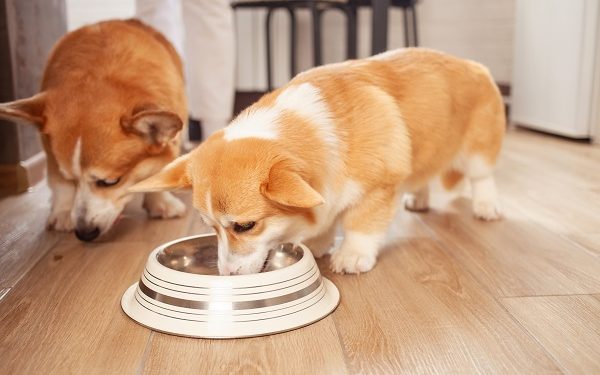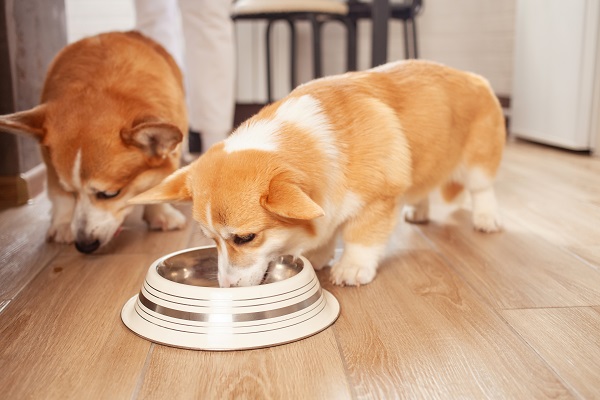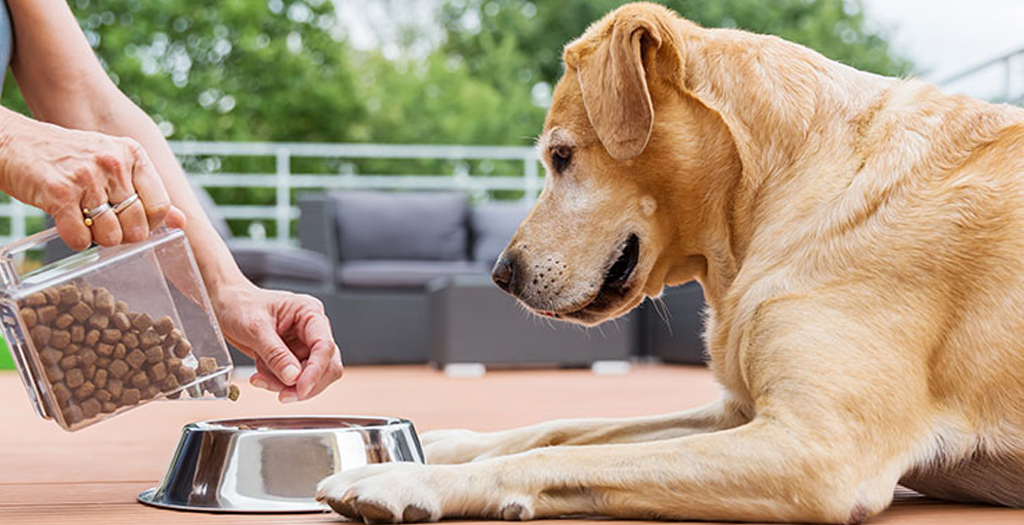If you’ve ever found yourself standing in the dog food aisle, wondering if once, twice, or all-day grazing is best for your canine bestie. It’s one of the most common (and passionately debated) questions among dog parents: How often should we feed our dogs?
For years, the go-to answer was simple; twice a day. Breakfast and dinner, spaced out for balance and routine. And honestly, that still works beautifully for many pups and their humans. Dogs love structure, and two meals a day offers a rhythm that supports everything from potty breaks to pill time.
But recently, some fascinating new research has started to shake up this long-standing tradition and it’s making many tails wag in sync in the world of canine health.
A major study from the Dog Aging Project, involving tens of thousands of pups across the U.S., suggests something surprising: dogs fed just once a day might experience better long-term health; especially as they grow old. We’re talking fewer issues with digestion, joints, kidneys, and even brain health. Mind blown? You’re not alone.
So, what’s a devoted dog parent to do? Stick with the tried-and-true routine? Try the once-a-day trend? Or somewhere in between?
That’s exactly what we’re here to explore. 🐶
In this guide, we’ll dig into:
- Why dogs thrive on routine (and what that really means)
- The pros and cons of common feeding styles — including twice a day, once a day, and free feeding
- What the latest science is telling us about longevity, cognitive health, and mealtime
- And most importantly: how to make the best choice for your unique dog, with vet-backed advice and heart-led insight
Whether your doggy is a bouncy puppy, a mellow senior, or somewhere in the glorious middle, we’ll help you understand what feeding schedule might work best, not just for today, but for a lifetime of healthy, happy tail wags.
Let’s dig in (pun totally intended). 🐾
Why Could Feeding Once a Day Be Linked to Better Health?
So, if feeding your dog just once a day might support better health, the natural question is why?
First, let’s be clear: the Dog Aging Project found an association, not a cause. That means dogs who eat once a day tend to show fewer signs of certain health problems, but it doesn’t prove that the feeding schedule is the reason why. Still, the findings open the door to some interesting possibilities worth exploring.
- Echoes of Intermittent Fasting
Feeding once a day creates a built-in fasting window, kind of like the “intermittent fasting” trend in humans. In lab studies, animals like mice and rats have shown longer lifespans and slower aging when their calories are restricted or spaced out. The theory? Giving the body regular breaks from digesting food may help it focus on repairing cells and reducing inflammation.
Dogs aren’t mice, of course — but they’re also very close to humans in how they live and age. So, researchers are curious if a similar effect could happen to our four-legged friends. Longer fasting periods might also give a dog’s digestive system and pancreas a little extra time to rest and reset.
- Less Risk of Packing on the Pounds
Another big clue may lie in body weight. Dogs who eat once a day may simply be less likely to become overweight. And that’s a big deal, because extra pounds can put pressure on joints, strain the heart, and raise the risk of diabetes and other chronic issues.
The Dog Aging Project didn’t yet include detailed body condition scores in their early results, so we don’t know for sure if weight played a role. However, future research is already aiming to dig into that piece of the puzzle.
- Back to Their Roots
Some experts also point to the evolutionary side of things. Dogs are closely related to wolves, who tend to feast after a hunt and then go without food for a while. That kind of feast-and-fast rhythm might be something dogs are biologically wired to handle — at least in theory.
Of course, our dogs today are more likely to chase tennis balls than elk. Their digestive systems and lifestyles have adapted a lot since their wild ancestors. So, while the evolutionary idea is fascinating, it doesn’t mean that a wolf-style meal schedule is automatically best for every pup.
Thinking About How Often Should We Feed Our Dogs? Here’s What to Consider
With all the buzz around the Dog Aging Project’s findings, it’s only natural to wonder — Is one meal a day enough for your Dog?
The short answer? Probably not, at least not without talking to your vet first.
Even the researchers, Dr. Emily Bray and Dr. Matt Kaeberlein, who were involved in the Dog Aging Project, are urging caution. While the data is exciting, it’s still early days in the study, and what works for one dog might not be right for another.
Here’s Why Experts Recommend a Careful Approach
1. Association Isn’t the Same as Cause
The study shows a link between once-daily feeding and certain health benefits, but that doesn’t mean the feeding schedule is what caused those outcomes. Other factors could be in play, like weight, genetics, or lifestyle. So, before changing your dog’s routine, it’s important to look at the full picture.
2. Every Dog Has Different Needs
Your dog is wonderfully unique, and their ideal feeding schedule depends on several personal factors:
- Age: Young puppies need to eat more often to fuel their fast growth. Senior dogs may also benefit from two or even three smaller meals.
- Breed and Size: Small breeds can be prone to low blood sugar and often do better with multiple meals. Large, deep-chested breeds are at greater risk for bloat, a serious condition, and experts often recommend splitting meals to help reduce this risk.
- Activity Level and Metabolism: A couch-loving companion may need fewer calories than an energetic hiker. Some dogs also burn calories faster than others.
- Reproductive Status: Nursing moms or pregnant pups need more food, while spayed or neutered dogs may need fewer calories overall.
3. Health Conditions May Require Specific Schedules
For dogs with certain medical needs, feeding frequency isn’t optional — it’s essential.
- Diabetic dogs, for example, typically need two meals a day to help stabilize blood sugar levels alongside insulin.
- Dogs with sensitive stomachs might feel nauseous or even vomit if they go too long without food — a phenomenon known as “hunger pukes.” Smaller, more frequent meals can help here.
- Fast eaters can benefit from having their food split into smaller portions to prevent tummy trouble or bloating.
4. Your Dog’s Happiness Matters Too
Feeding isn’t just about nutrients — it’s also about comfort and routine. Some dogs genuinely enjoy the rhythm of breakfast and dinner. They look forward to it, they settle better, and it’s part of what makes their day feel right. And that matters.
5. It’s Not Just When They Eat — It’s How Much
No matter how many meals your dog eats, what’s most important is that they get the right number of calories for their age, size, and activity level. Overfeeding and underfeeding can both lead to serious health issues. So if you’re rethinking your dog’s diet, start with portion size and nutrition before adjusting the clock.
The Real Key to a Healthy Feeding Routine: Your Vet’s Guidance
With so many factors at play — age, size, health conditions, even your dog’s personal quirks — figuring out the “right” feeding schedule can feel like a bit of a puzzle. That’s why the best move you can make is to lean on your most valuable partner in your dog’s health journey: your veterinarian.
Your vet knows your dog as more than just a breed or a number on a scale. They can offer tailored advice based on your dog’s:
- Life stage (puppy, adult, senior)
- Current weight and body condition
- Health status and medical history
- Unique dietary needs or sensitivities
From there, your vet can help you choose the right food — one that’s complete, balanced, and suited to your dog’s lifestyle — and guide you on how much to feed and how often. If you’re considering a big change, like shifting to once-a-day feeding, they’ll walk you through the pros, cons, and possible alternatives, all grounded in what’s best for your pup.
Want to go even deeper? Some pet parents also choose to consult with a board-certified veterinary nutritionist for added peace of mind, especially if their dog has special dietary needs.
Building a Healthy Routine While We Feed Our Dogs
Whether you feed your dog once, twice, or more each day, the most important thing is consistency. Dogs thrive on routine — it gives them comfort, stability, and helps with digestion and behavior.
Here are some simple tips to keep your dog’s mealtime healthy and happy:
- Stick to regular times that fit your daily schedule. Gradual changes are best if needed.
- Measure meals carefully — don’t guess; Use the feeding chart on your dog food bag as a starting point.
- Choose quality food that’s complete and balanced for your dog’s age and needs. Ask your vet for recommendations.
- Create a calm feeding space away from distractions. Clean bowls and slow-feed options can also help.
- Watch the treats — Restrict them to less than 10% of the diet.
- Always provide fresh water, and avoid exercise right after big meals.
If you’re transitioning to once-a-day feeding and your dog vomits bile in the morning (a.k.a. “hunger pukes”), it might mean their stomach is too empty for too long. A small evening snack might help — check with your vet first.
Dogs change over time, and so should their feeding plan. Keep an eye on their weight, energy, and digestion. If anything seems off, your vet is your best guide.
And if you’re curious about the science, the Dog Aging Project is still ongoing. They’re looking at how feeding frequency might impact health over a dog’s lifetime — and you can even join their study. In the end, remember, the best feeding routine is one that fits your dog’s body, lifestyle, and happiness, with your vet as your partner every step of the way. 🐾













Discussion about this post